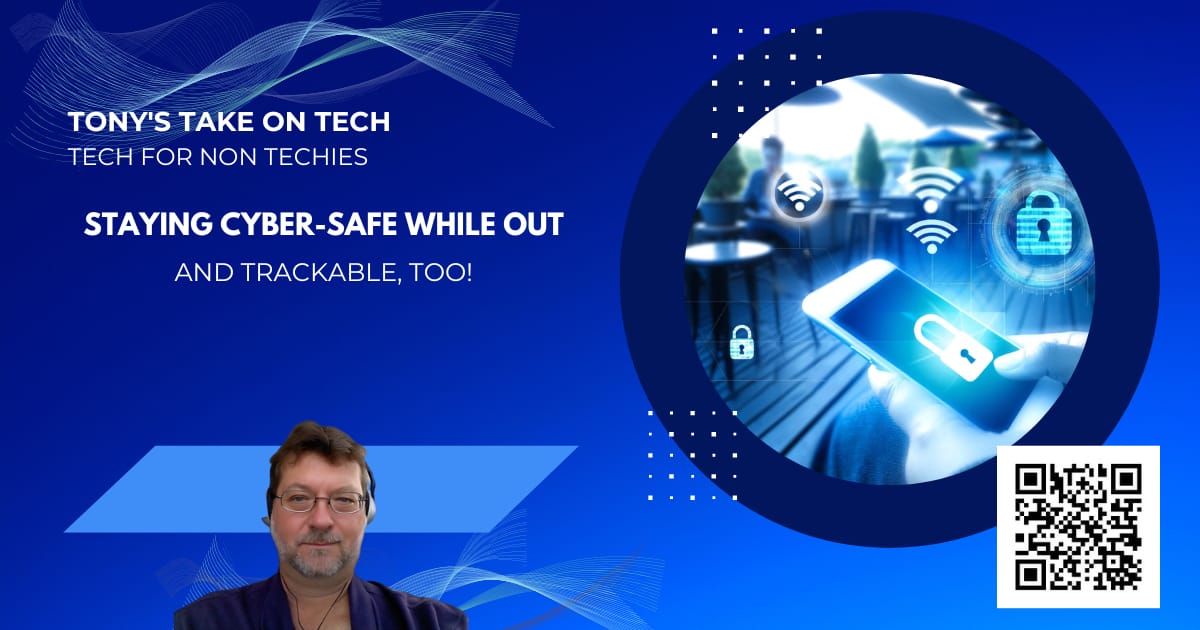
One question that’s often asked is how to stay relatively cyber-safe and secure while out and about. There's a whole range of things you can do depending on how worried you are about your personal electronic security. There are generally two main areas of concern, one being the safety and security of your communications and the other being the trackability of you and your devices. We'll take up securing communications first and deal with tracking later.
Your cellular communications are generally secure so if you don't automatically or manually connect to WiFi while out, your data should be generally safe. I say generally because if you're a high profile individual or are in an area with one or more high profile individuals your cellular signals could be intercepted by outside sources, decoded, and then relayed on to their destination. You can combat that by using a VPN, as I've discussed in previous articles. If you go into a big box store like Kroger or Walmart, your cellular signal may not be very good or might not exist at all. You might be tempted to just connect to the store's free WiFi but, again, as I've discussed previously, that signal may not be coming from the store - it's easy for someone to set up a hotspot using the same name as the store's WiFi and intercept your traffic. One option is to just do without a data connection but, in some cases, that's untenable so a VPN is your only alternative.
There are many VPN providers, both paid and free. I use NordVPN (https://nordvpn.com/), a paid service that has been analyzed by security professionals and marked safe. Another good option is ProtonVPN (https://protonvpn.com/). While I have no experience with it, Proton is known for their dedication to security and privacy. I generally shy away from free VPN services because, as they say, if you're not paying for a service then your information is the payment but that's not the case with CloudFlare's WARP (https://cloudeflarewarp.com or https://one.one.one.one/ - yes, that URL ends in ".one", not ".com"). CloudFlare is a major backbone provider for the Internet as a whole and they get paid for any data they deliver from their network so using their VPN pays them when they eventually hand off your traffic to its ultimate destination. They have a paid version which gets you a few additional features but their free service is quite usable.
Can you use your VPN with your cellular connection? A resounding yes! So I recommend just turning on your VPN when you leave the house and turn it off when you return. I realize that can be a bit of a chore but doing that frees you from any concern about connecting to any WiFi networks so there's no worry about connecting to your big box WiFi. I will say that some apps have an issue with a VPN (Netflix is one). All VPNs have a way of excluding specific apps from the VPN. Normally that's in a setting called "split tunnel" or something similar so if an app is misbehaving, go into your VPN's settings and look for that setting. Alternatively you can do a search for how to exclude an app from your VPN.
Should you be concerned about NFC (Near Field Communications) which is the technology behind Apple Pay and Google Pay? Not usually, because you need to open your Pay app to have it generate the token used to pay your bill. That token can only be used once so even if it's somehow managed to be intercepted it can't be used again.
Should you be concerned about Bluetooth? Not generally, no, because any connection or data transfer over Bluetooth will require your consent.
What about your watch? I'm not aware of any VPNs for watches so I'd recommend turning WiFi off on your watch or just make sure that it only connects to known WiFi hotspots.
What about trackability? That's a bit more complicated. Any of these signals can be used to track you. The tracker may not know it's specifically you by name, but it can put it all together and recognize your device wherever you go. Some people recommend using a Faraday bag (https://www.howtogeek.com/791386/what-is-a-faraday-bag-and-should-you-use-one/) and that will definitely stop any sort of tracking but it also means you can't use any of your devices while you're out - and don't forget to put your watch in there, too! Additionally, if you have any medical devices which require a connection to your smartphone, like a Continuous Glucose Monitor or CGM, the app to which it connects could get quite upset about losing access for any length of time. Not to mention any signals your medical devices emit.
Short of using a Faraday bag, there's not really any way to guarantee you can't be tracked, even if your phone is off - see https://www.tomsguide.com/news/bluetooth-device-tracking. Again, they don't know it's you by name, they can just recognize your phone's or watch's signals so as you move around data collectors can be vacuuming your presence and feeding it into a massive database. Just remember to turn off Bluetooth discoverability and don't pair with any new devices while out. If you want to know more about Bluetooth security, see https://www.makeuseof.com/what-is-bluetooth-encryption-how-does-it-work/ but I warn you, it gets pretty technical.
That's all for this week's column. I hope this helps you understand some of the basics about how to maintain your cyber-security while out and about. Don't hesitate to write to me if you have questions!
As always, my intent is to help you understand the basics and equip you to search for more detailed information.
Please feel free to email me with questions, comments, suggestions, requests for future columns, to sign up for my newsletter, or whatever at [email protected] or just drop me a quick note and say HI!
You’ve got choices as to how you read my columns! You can read all my columns and sign up for my newsletter to have them delivered to your email when I publish them at https://go.ttot.link/TFTNT-Newsletter. You can read the most recent column in the Hillsboro Times Gazette at https://go.ttot.link/TG-Column - it should be updated shortly after this column appears in the online version of the newspaper.

